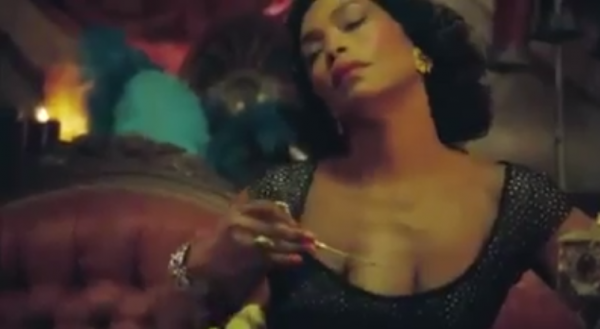
Adapted from a g-chat between Caty Simon and Maggie Mcmuffin:
American Horror Story: Freak Show draws on the traditional connection between perfomativity and sex work. Acting has always been connected with prostitution, since before the Jacobean era to very recently. And by connecting performance in a freak show with sex work, the show is pathologizing both.
The show’s creators might argue that they’re humanizing these “freak” characters, but why else would they see the freak show as a perfect setting for a horror story if they weren’t pathologizing it? In a lot of these characters’ stories, sex work is naturally connected to freak show performance—it’s just one rung down a ladder of degradation. Yet, despite that innate problem with American Horror Story’s sex worker representation, many of its central characters this season have been revealed as sex workers, so Maggie Mcmuffin and I couldn’t resist taking a closer look at the first five episodes.
Maggie McMuffin: A lot of the time, historically, freak shows were a way for people with disabilities to make their living on their terms. For the most part, they were very non-exploitative.
Caty Simon: I think that AHS does capture some of that feeling of family, the connection of a marginalized group taking shelter with each other against the world. But they also play on these supposed deformities for chills and laughs. And AHS’ Freak Show does constantly threaten its participants with exploitation. Both the Strong Man and Elsa are shown to be dictatorial and oppressive bosses.
Four depictions of sex work in the first five episodes—at least that’s a good amount of representation if nothing else.
So, how about Jimmy Darling, the first time we see him, in those head-to-toe leathers that scream “midcentury hustler”?
Maggie: Oh god, they do, he’s clearly going for that Marlon Brando swagger and it works.
Caty: I really liked the fact that he serves female customers via a Tupperware party. That’s so cutely 50s.
Maggie: I love that it’s the women at that party who we see talking the most and expressing their sexual needs.
Caty: It’s true to life in that the clients fetishize his disability—his flipper becomes all about its fingerbanging fun potential.
Maggie: The men from Elsa’s flashback don’t talk much. We don’t hear much from the boys Desiree is seeing. But those housewives are all about getting off.
Caty: I did think it was a bit of a cop-out in that it’s a portrayal of a male sex worker serving women clients when we know, realistically, how tiny that market is. But I did love his saucy grin as he worked.
Maggie: True. I’m torn between that and enjoying seeing the female gaze get played to.
Caty: And we do see Andy the bar hustler serving a male clientele later, so that balances it out somewhat.
I think this first instance of sex work contrasts quite a bit with how it’s shown later. There’s no degradation, no dark shadow world and dim lighting to match, he’s just happily making bank while he can. On the other hand, I don’t think it’s a romanticized portrayal, either.
Maggie: Nope. It’s very straight forward. It’s funny—the tupperware party—but let’s be real: most house party situations are hilarious. Bachelor parties are hilarious to me, every one of them I’ve worked.
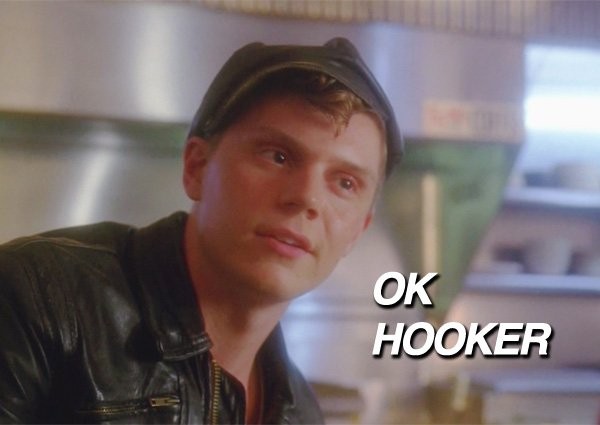
Caty: So, Angela Bassett as Desiree Dupree.
Maggie: Bonafide “hermaphrodite”—which is a problematic term but I don’t think “intersex” existed yet. I am loving her character. For our second sex worker we have an intersex woman of color, whom no one questions as a woman.
Caty: And this is an…ok depiction of an intersex character, fairly positive, and on TV I guess we have to be grateful it’s not a dozen times worse. But they did bring up the question of Desiree’s womanhood in episode four with that little girl asking her if she’s really a lady. Which didn’t even make sense as she “passes” totally.
Maggie: Yeah, that made no sense. But I do love that the men she’s seeing don’t question it. And when Elsa asks Dell what sleeping with a woman with a penis makes him, he just says “happy.”
Caty: In the second episode when Desiree’s character was introduced, her intersex status was handled pretty well. In contrast, her sex working past is handled atrociously. That flashback to her seeing that client in her show tent; it’s all dark palettes, meant to underscore the fact that this is the dark underside of her life. It’s so typical and boring.
Maggie: I thought it was just flashback coloring. AHS has a history of making flashbacks different in tone than the present day. Stylistically, the flashbacks will stand out visually. In Asylum they made all the flashbacks look like home video footage. In this season we have the silent film footage for Elsa and a darker palette for everyone else. Granted, most of the flashbacks have been about “darkest hours” thanks to the Mordrake episodes.
I really want to see more of Desiree. Because even though she’s fine with sex work and using her body however she wishes, Dell is not happy with her sex work.
Caty: I also thought it was pretty damn typical that they made the flashback episode about her seeing a client all about her partner’s murderous jealousy in reaction to it. It’s so basic, as if the show itself was crowing that clichéd civilian response: “But what does your boyfriend think of your job?” Of course, we don’t get any inkling of what the work means to Desiree, just what it means to Dell.
Maggie: She seems like she likes it but we only see her with a client who she’s trying to comfort.
Caty: I also thought that the theme of fetishization continued here—the client sees Desiree’s intersex status as a convenient ex-gay therapy embodied.
Maggie: Dell also is shown to have a history of being with women with physical characteristics that are typically thought of as male. In the fifth episode, it’s revealed that he’s infatuated with a male sex worker who works at a local gay bar. That, coupled with the gay client, raises some thoughts about how Desiree is being used by multiple characters as a very well-equipped beard.
Caty: I don’t remember the exact quotation, but the gay client said something like “I never thought I could be with a woman, until now.”
Maggie: He calls her a miracle worker and his salvation: “I never dreamed that I would ever be able to do this with a real woman.”
Caty: The show is implying that no truly straight man would be happy with an intersex woman. So there’s a black mark in its intersex politics.
Maggie: She tells him not to get ahead of himself, too, when he starts going off about feeling like he can have a normal life. And then she asks if he wants “her extra bit of business.”
Desiree also says at another point that gay people are lower than freaks. So there’s some weird homophobia happening here. She makes a face over the guy saying he’s cured and then offers up her dingaling. It’s like she doesn’t really want to help him.
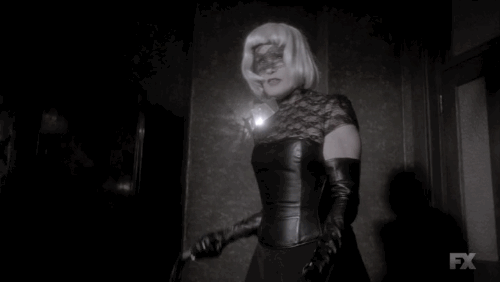
Caty: Clients often expect that we can somehow fix them—how, through our magic healing genitalia? Or else somehow convince them they aren’t broken in the first place. But we sell sexual services, not salvation.
Maggie: Sex workers can’t heal all romantic and sexual issues. But people want salvation. They want to know they’re okay. And that’s what’s happening here. This is a gay man who clearly wants to be “fixed.”
Caty: And sometimes in the heady atmosphere of commercial sex they can make believe that they’re not only getting laid, they’re being somehow enchanted and elevated.
Maggie: We were all disappointed by Elsa’s flashback in the fourth episode.. The thing that stuck out to me is that Elsa adheres to the whorearchy and to a hierarchy of disability.
Caty: I was crushed by how badly they did this episode given how great the material could have been. I mean, it’s Weimar Berlin! Such a rich mine of sex worker history. It could’ve been fabulous.
Maggie: “Sexual chaos” is how Elsa describes it. She says everything in the country is broken, so everyone just turns to deviant sex.
Caty: Right, she pathologizes the sexual openness of the period, ties it to cultural trauma from the first World War and desperation fueled by the Depression. And as for her personal story, it’s the same rigmarole, lateral whorephobia all the way: “I didn’t touch my clients like those other girls did.”
Maggie: “I’m a domme. I don’t fuck clients.”
Caty: For Elsa, doing sex work is about selling yourself till you don’t have any “humanity” left.
Maggie: And Elsa literally has her body taken from her when her legs are amputated on camera.
Caty: …while the show further propagates the damaging myth of the snuff film.
Maggie: A snuff film made by Nazis even!
Caty: For every one actual snuff film ever produced, there are probably about a million fictional stories spun about them.
Maggie: Elsa changes how she refers to herself in the course of the flashback. She starts out by saying “I wasn’t like those other whores,” placing herself above other sex workers. But at the end, after she’s lost her legs, she refers to herself as a “whore.”
It’s all meant to correspond, I think, with Elsa’s dreams of stardom. She performed at the top hotels, she was a beloved porn star, the snuff film made her famous. It wraps up with her chanteuse dreams. She uses the same terminology about both. She was known for being “creative” and “no one puts on a show better than [she does].” Her domme look is a wig and a mask. It’s very much a performance for her as well as something she’s ashamed of.
Caty: It’s made very clear that she was a privileged sex worker—and yet she was miserable and degraded, because sex work itself is supposedly innately miserable and degrading. And while it’s true that there are plenty of privileged sex workers who have distaste for or even hate their jobs, there are fewer of those than survival sex workers that hate their jobs, and I think here they weren’t just implying that Elsa disliked or even loathed her work. They’re implying that no one could possibly like that work.
Maggie: She claims, “You trade away your humanity trick by trick.” And her sex work does tie in with her work with the freak show. When Mordrake comes to take her to her doom she screams that she’s not like the others. She’s not really a freak. It’s very similar to her saying she’s not like the other sex workers. Because Elsa is a star. And stars are within the bounds of social acceptance
Caty: Perhaps here we’re meant to see Elsa’s adherence to respectability politics and the whorearchy as part of the innate elitism of her character.
Maggie: I think so. Also, Mordrake wants to hear about her legs. He wants to hear about the worst of it. He’s going around asking people with disabilities about the worst thing society has done to them. And he’s asking Elsa the same thing but also pushing for the worst thing about her sex work past. Elsa’s disabled and a sex worker. Clearly, she’s the worst of the lot. Until she isn’t. Also, it makes no sense to me that the snuff film even happened.
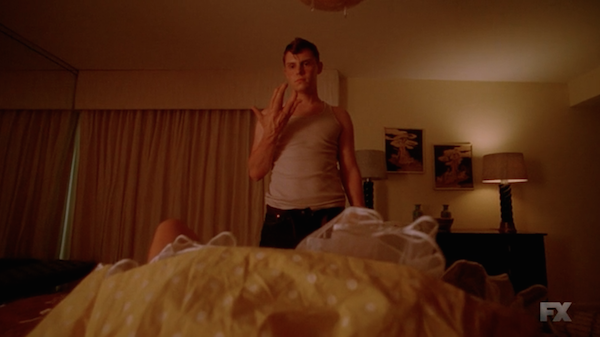
Caty: Yeah, if she was making men “ejaculate gold,” why would they kill that golden goose? Errr, the goose that makes men ejaculate gold sperm? Mixed metaphor land.
Maggie: So maybe, she wasn’t all that? But we have no other narrative to back up that theory. We just have guys drugging her and cutting off her legs.
Caty: It’s very reminiscent of abolitionist fabrications in that not only is it an exaggeratedly horrific story, it doesn’t even make sense. Abolitionists manage to deflect away from the worst of sex work that way—our real problems—because they seem to have no idea how the industry works and how it really does prey on people.
Maggie: The flashbacks are done differently. Desiree’s is darker but Elsa’s is filmed in clean black and white like a movie.
Caty: I think that’s just AHS‘ cliche vision of how pre-war Berlin is supposed to look—it was filmed in black and white, so we’ll film it in black and white too.
Maggie: Elsa even gets saved by a stalker. On the one hand, this makes the point that the porn industry is worse than most clients are. On the other, the client was only there to save her because he was in love with her and followed Elsa everywhere which is not okay. It just ended up being lucky.
Caty: I did think that it was odd touch to make the client the life saving hero, even the stalker client. Because in paint-by-numbers visions of sex work like this, clients are usually universally demonized, or, at best, made to look pathetic. Though I guess a stalker client falls into that latter category
Maggie: Really, he just adds to Elsa’s feeling of loss. Because she wishes he hadn’t saved her. It flips her power dynamic with him.
Caty: And there’s some almost accidental realism to that—how the clients who are deluded into thinking they love us haven’t the first clue what we want and who we are.
Maggie: “I’m saving you! Look at me saving you! Just like you always wanted!”
Caty: Elsa’s client gets to live out the masturbatory fantasy of every Captain Save-A-Ho.
Maggie: On a funnier note, they did puppy play. So I find it funny that he rushed into save her like Lassie.
Caty: The fifth episode introduces a sympathetic sex worker character only for him to become a murder victim before the closing credits. Yet again, just as in the distorted vision we’re given through Elsa of Weimar Berlin, AHS mines a rich vein of sex worker history only to ultimately do it a huge disservice in their portrayal. In this case, it’s the 50s hustling scene of the mafia-run gay bars where Kinsey did his initial interviews, a milieu no show has even covered yet except for Masters of Sex’s brief flirtation with it over the past two years. AHS brings it vividly to life through Andy, his sketching, and his cool professionalism, only to have him diced to pieces while still breathing by their flat, boring, rich-boy serial killer.
Maggie: In this episode we discover that of course Dell, the partner of an intersex woman, isn’t straight. Way to stick to binaries, AHS!
Caty: One thing AHS does here is do a beautiful job of depicting the innate selfishness of the Captain Save-A-Ho client’s professed love—Dell says if Andy is leaving, he’s going to leave with him, but as Andy points out, that’s only going to happen on Dell’s fantasy time table. And in the meantime, the jealous possessiveness he calls his love for Andy just looks like domestic violence: “There are no other guys but me!” he shrieks, standing up from the table and looking threatening enough that the club’s proprietor aims his shotgun at him until Andy waves him down.
Dell whines about the fact that Andy “gives himself” to “creeps pawing” all over him when “they don’t give two shits about you.” Yet, at least Andy’s other clients allow him his autonomy and don’t actively work against his best interests by trying to keep him from earning a living
This is also another example of someone doing everything but listening to a sex worker. Dell claims to love Andy, and yet he doesn’t listen to a word he says—doesn’t listen to him when he says he likes it at the bar and that he doesn’t want to leave, doesn’t listen to him when he patiently explains, probably not for the first time, that when he’s at the bar, he’s working—this is his office.
AHS does well poking holes in the bluster of the Captain-Save-A-Ho figure: “[You] love me?” Andy scoffs, “You’ve been in town a month!” Yet, ultimately, none of this insight into a sex worker’s life means much because it’s bad client and bad sex worker boyfriend Dell who gets the screen time, who gets to be the POV character, while the show efficiently kills off Andy in one episode and Desiree’s sex worker past is only introduced as a way to explain why Dell was forced to leave one troupe for another.
Maggie: Fuck Dell. Andy’s death was awful and brutal. But the scene with Dell hit me harder—the jealousy and the possessiveness.
Caty: It’s interesting that here we have a client, Dell, who’s also a member of the working class, who, as a circus strong man, is someone who also makes their living using their body. He’s really a lot more like Andy than the other johns are. As Andy ruefully notes, nobody’s inviting Dell to join the Chamber of Commerce. Yet he makes this speech to Andy—about how when he’s bending those metal bars, or has three acrobats stacked on top of him, the pain feels like hot lead in his chest, totally oblivious to the fact that what he’s describing isn’t too different from the bad working conditions Andy just told him about, the blood in his shorts when someone gets rough or the load in his face. Instead, he shouts Andy down when Andy confides in him, telling him he’s told him not to talk about those things with him. He understands it as a provocative display of infidelity, not Andy telling him about his labor problems. If you took it far enough, this could be a personification of the unions’ political alienation of the sex workers’ rights movement—they think we’re talking graphically about sex, but really, we’re talking about work and the body. (Not that I think AHS set out to make a point about the labor movement.)
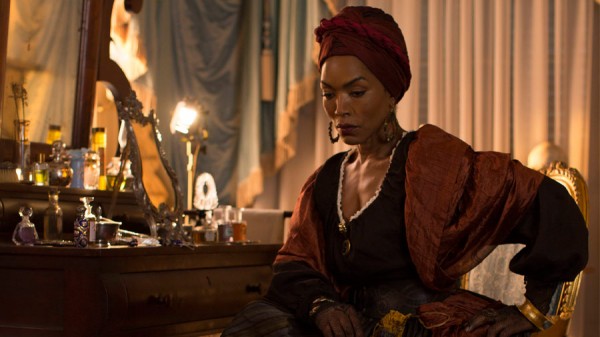
Maggie: Exactly. Injuries happen in sex work. Sometimes those injuries are a result of sexual activity. That doesn’t make them any less valid.
Caty: And there are better workplaces and worse ones. Notice Andy doesn’t say “I like hustling.” He says,”I like it here,” noting that the proprietor keeps the cops paid off and out of their hair, and so he feels relatively safe.
Maggie: Andy’s club seems pretty nice and secure, actually. He seems able to turn people down. He’s got a nice little price system.
Caty: Though inflation makes “$20 to take me out for the whole night” sound a little sad. Still, I like how he’s paid a dollar even for them to just sit down with him—the emotional labor of making conversation until the deal is settled on isn’t uncompensated. Whereas most of us have to take it as a loss.
Maggie: I know most of the guys who I talk to don’t tip me. Seriously, if I got even one dollar from every guy I spoke to for longer than a hello, I would make 20-150 extra bucks a night
Caty: Has there been a more graphic murder on the show than Andy’s, so far? Where they have him legless and begging to die?
Maggie: Nope. AND WHY IS HE STILL ALIVE AFTER ALL THAT?
A friend pointed out that they probably wanted Dandy to look really inept at killing. But after you stab someone repeatedly and then cut off their arm and let them bleed? They’d at least be passed out or in shock, not conscious and suffering. It was gratuitous.
Caty: Right, they insert the death of this vibrant new character into Dandy’s flippant little “how can I murderz?” interlude with himself.
Maggie: However, Dandy shouting “you’re making me feel bad” brings up a great point about bad clients. The idea that they can buy your body and then do whatever they want with it and you. How dare Andy exert his bodily autonomy by asking for death or to be saved? Dandy paid him a hundred dollars! That totally trumps Andy’s needs and wants. Basically, that scene plus the one where Elsa loses her legs are all about the misconception of sex workers selling their bodies taken to the extreme.
Caty: The scene also portrays how easily the bad client mentality segues into violence against sex workers.
Maggie: Dandy was told he couldn’t pick up vagrants so he went and “bought” a person, the way he later buys the twins. People are buyable to Dandy because he’s just that rich.
Caty: I thought that was interesting. His mother tells him that it’s the 50s, so he can’t pick up vagrants and slaughter them anymore—people are missed. So, of course he goes and murders a sex worker: the only person lower than a vagrant.
Maggie: No one misses sex workers. Especially not gay sex workers.
Caty: A gay sex worker has no doubt already been disowned by their family. Or, at least, so Dandy would think.
Maggie: I hope that bartender saw Dandy leave with Andy and there’s a follow up on that. There goddamn better be. The bartender clearly paid attention to the welfare of sex workers in his club. And with Andy’s price system, how Dandy had to pay extra to get him out in the woods? I would think Any would make a security check-in. I mean, at my club we have to check in if we go downstairs or to smoke. I would think Andy would check in to go to the woods.
Caty: Hopefully the show will point out the fact that queer sex workers form communities of their own, especially back in those days when they had no one but each other.
Maggie: Maybe they’ll subvert it like they did in American Horror Story: Asylum? Where the first sex worker shown ran to the cops about the guy who roughed her up and they actually listened to her and followed up on her story?
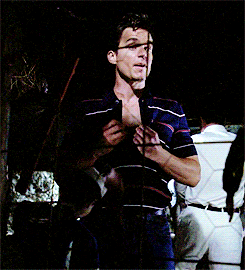
Caty: Hopefully protective bartender Murray won’t be another in a series of dropped AHS storylines.
Maggie: We can only hope.
Caty: It’s interesting how, even while killing Andy, Dandy feels compelled to insert a “no homo” into the proceedings—even though serial murder is almost always innately sexual. I think it says something about how those who hurt sex workers are almost always struggling with and viciously denying their desire for us.
Maggie: And here Dell is also denying that he’s queer. Because the show keeps saying that in this town, gay men are worse than the freaks. They’re the only ones people hate more.
Caty: The show focuses quite a bit on lateral hostility. As soon as Desiree finds out that she’s biologically a woman, biologically gender appropriate and can have cosmetic surgery to remove the parts of her anatomy that are gender deviant…
Maggie: …she’s on that train.
Caty: …she turns on Dell for his biological deviance, because his father manifested the genes that made Jimmy, his son, inherit the lobster hands.
The show is about difference, but no alliances can be made because the question on everyone’s mind is “who’s the real freak?” Not, “how can us freaks band together?”
Maggie: “I’m not like the other others” is a phrase that comes up a lot.
Caty: As does the plotline in which someone is hiding deviancy and “passing” while living among deviants.
Maggie: Dell passes for straight and genetically “normal.” Bloodlines come up a lot. In the same episode, Dandy’s mom talks about how he’s like his father and rich people who marry cousins all end up mentally ill and murderous. The theme is that even if you aren’t outwardly Other, you can still be carrying Otherness and pass it on to future generations.
Caty: So how do sex workers fit into all these bleak meditations on being Other? And turning on the person next to you for also being deviant, maybe being more deviant? Aren’t sex workers always the ones people blame when they play out their own deviance on our bodies?
Maggie: Sex workers are Others, Others by choice. It’s this strange paradox where on one hand it’s seen as a choice but also as the last resort.
Jimmy’s saving up money to leave the show and strike out on his own. Desiree…well, you already mentioned that her sex work is shown to showcase Dell’s temper rather than to say anything about her. Elsa did it to survive. Dell thinks Andy is doing it because he has no one to take care of him.
The show is actually doing a fair job of showing that people do this for money and that it’s a job. Sure, Andy wants to be an artist. He’s keen on the idea of selling $2 caricatures on a boardwalk. But he doesn’t hate sex work. He likes his work spot and he’s working towards getting where he wants to be.
Caty: The show frustrates me because it’s such a mixed bag where representation is concerned. Some things it gets right, but it doesn’t take that extra step to get it completely right—like not going the dead hooker route, or actually centering the perspectives of sex workers rather than those of their clients and partners.
My verdict so far is that AHS’ sex worker representation is a mess, but it’s got enough insight to it that it could be redeemable.
Maggie: I never hold out too much hope for Ryan Murphy to give solid representation. But he does like to dangle that carrot and I just keep chasing it.
This is my show right now. Just finished season 3. Can’t wait for the Freakshow ones.
The parallels between sex work and freak show work are totally fascinating and under-explored. Your write-up has convinced me to finlly suck it up and watch this show. Thanks!
Just saw the Tupperware party one!
Good stuff ( even though the market is truly so small it’s a little unlikely ).
My stud muffin has been downloading these for me. They aren’t on Hulu yet.